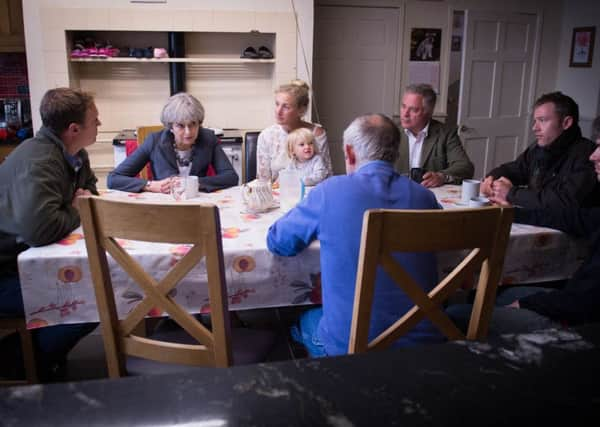Sarah Todd: It's vital to listen to our farmers as we leave EU


The Yorkshire Agricultural Society, which contributes £47m a year to the local economy through events at the Great Yorkshire Showground, has taken the two-day initiative to help youngsters understand farming, the environment and countryside.
Very worthy. Top marks to the organisers. It seems sensible – given the almost non-existent mention of farming in the run-up to the General Election – to extend the invitation to Theresa May and her new cabinet.
Advertisement
Hide AdAdvertisement
Hide AdDon’t bother sending one to Andrea Leadsom who headed Defra prior to the election. She failed to muster any kind of passion for the industry despite being in post for the past 11 months.
Get rid of her Theresa and listen up. Nearly half a million people in the UK work in the agricultural sector, contributing £8.5bn into the economy each year.
For an election that was supposedly called for the good of Brexit negotiations, the last few weeks of political froth, staged studio appearances and photo opportunities have seen farming reduced to an afterthought. Yes, the industry couldn’t expect to eclipse debate following the terror attacks in Manchester and London, but farmers deserved more than the Prime Minister’s 11th-hour cup of tea in a Welsh farmhouse and dawn visit to Smithfield Market.
Yes, more than two-thirds of farmers voted to leave the European Union but that doesn’t mean they can be left to sink or swim.
Advertisement
Hide AdAdvertisement
Hide AdAs we wave goodbye to the EU, feeding the nation will become more – not less – important. We can’t be left at the mercy of import taxes. Agricultural products outside the EU can have tariffs averaging around 22 per cent. There is a widespread fear in the farming community, which (surprise surprise) wasn’t addressed in the election campaign, that imported food will feature as a giveaway in trade deals as a sweetener where the UK wants to sell other non-farming related goods or services.
Britain has an £18bn food export economy and it would be criminal to take it for granted. It needs fighting for, as well as to be nurtured and grown. After all, the majority of farmers would rather untangle themselves from the red tape of subsidies and be paid a fair price for what they produce.
A Farmers Weekly poll showed 71 per cent of respondents intended to vote Conservative in this week’s election. So, the farming community has supported you Mrs May, it’s time you supported them.
But ‘farming community’ shouldn’t mean the British aristocrats who have, over the years, creamed off millions in subsidies from Europe’s common agricultural policy.
Advertisement
Hide AdAdvertisement
Hide AdIt is fundamentally wrong that some of the country’s richest landowners have been able to claim this and it will do nothing for goodwill towards everyday farming folk if UK taxpayers are expected to continue feathering their nests for them after Brexit. It’s a subject that needs sorting out. Not in time, but right now. Payments in the limbo land of post-Brexit need to be at the top of the agenda as the UK comes up with its own agricultural policy.
The British people are fair-minded enough to understand the hardships of a family farm but as Chris Bryant, the Labour MP for Rhondda has raised at Prime Minister’s Questions in the last Parliament, huge payments to the landed gentry just don’t seem right.
Among others, Mr Bryant cited over £400,000 a year in payments to the Duke of Westminster (estimated worth more than £9bn).
To look to the future, wouldn’t it be wonderful if Brexit brings us more home-grown agricultural workers? Education has been guilty in the past of seeing agriculture as a second-rate career choice.
Advertisement
Hide AdAdvertisement
Hide AdBut while the next generation are being inspired thanks to the likes of the Yorkshire Agricultural Society’s initiative, there is no getting away from the fact that fruit and vegetable farms, as well as many big dairies and pig units, have become reliant on foreign workers to plug staff shortages. There’s no point pretending that around one in five employees in agriculture doesn’t currently come from abroad. Who is helping sort the nitty-gritty of this out? That’s the thing with farming. The cows will still need milking and the corn combining. They can’t be put on hold while the Government gets its act together.
There is a misconception that the farming economy is simply the welly-booted son of the soil. It’s much more than that. A vast range of industries, from machinery suppliers to tourism businesses, depend on a profitable farming sector.
Domestically, there are issues like milk prices and Bovine TB that no Government seems to have got to grips with.
TB has become a taboo subject politically. Nobody wants to jump into the debate that comes with proposed badger culling.
Advertisement
Hide AdAdvertisement
Hide AdThis pussyfooting around should stop now. Unlike others, the farming community has backed your ‘strong and stable’ message Mrs May. It’s time you listened to them. Anything else is udder nonsense.
Sarah Todd is a former editor of Yorkshire Life magazine. She is a farmer’s daughter, mother and journalist specialising in country life.